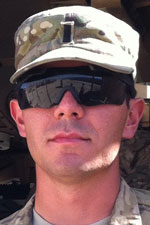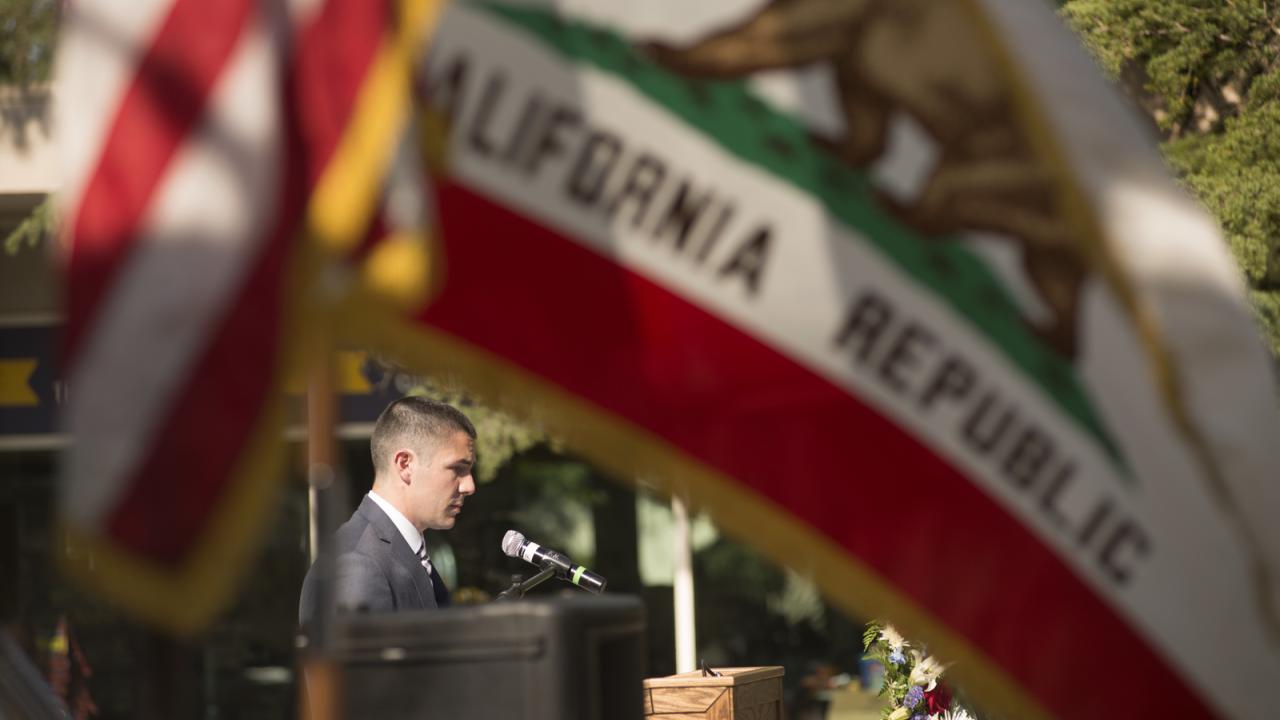Army veteran and UC Davis law student Nick Chase gave the keynote address at this year’s UC Davis Memorial Day Ceremony, held May 26 on the Memorial Union’s South Patio. Here is the transcript of his speech, or listen to it (embedded below). Read about the overall ceremony here.
•••
Gold Star Families, Ladies and Gentlemen, Distinguished Guests:
Welcome to today’s Memorial Day Ceremony. I am honored to have this opportunity to speak with you on such an important occasion.
I would like to begin by reading an excerpt from Laurence Binyon’s poem For the Fallen, which was written for an occasion such as this.
Solemn the drums thrill: Death august and royal
Sings sorrow up into immortal spheres.
There is music in the midst of desolation
And a glory that shines upon our tears.
They shall grow not old, as we that are left grow old:
Age shall not weary them, nor the years condemn.
At the going down of the sun and in the morning
We will remember them.
There are 135 Gold Star Aggies. Seven from WWI, 111 from WWII, three from Korea, four from Vietnam, one from Iraq, eight during peacetime and one who died under unknown circumstances.
Altogether, these men represent over 100 years of service to our nation and 100 years of sacrifice. I would like to take a few moments now to recount some of their stories:
Major Lawrence Phillips graduated from UC Davis in 1929. While at UC Davis, Major Phillips was vice president of the ASUCD, as well as Picnic Day chairman. He was killed in the Philippines in 1944, where he was tasked with organizing Philippine guerilla forces. He was awarded the Distinguished Service Cross in recognition of his extraordinary heroism. As further testament to his bravery, he was buried with full military honors by the Japanese forces on the island due to his being held in esteem by the Japanese commander who regarded him as a “great and gallant soldier and a worthy adversary.” General Douglas MacArthur sent a personal letter to Major Phillips’ family which read as follows:
“In the death of your son, Major Lawrence Phillips, I have lost a gallant comrade in arms. … His service under me in the Pacific was characterized by his complete devotion to our country, and by giving his life in our crusade for liberty he is enshrined in the nation’s glory.”
Captain John Barovetto was a graduate of Davis High School, where he was named one of the best athletes to ever graduate and later attended UC Davis for two years from 1956 to 1958 where he was quarterback for the football team. Captain Barovetto was killed in action in the Que Son Valley in Vietnam in 1968. However, in addition to his exemplary military service, for which he was awarded the Silver Star, Captain Barovetto is perhaps best remembered for organizing Operation Helping Hand, a humanitarian mission in which he enlisted the support of the citizens of Davis to supply over 5,000 pounds of food and over $2,500 to the village of Chu Lai, Vietnam, that was then used to aid the children of that village.
Lieutenant Colonel Mark Taylor graduated from UC Davis in 1986, where he was the Distinguished Military Graduate from the ROTC program. Lieutenant Colonel Taylor was an Army surgeon whose dedication to his fellow soldiers is exemplified by a line in a letter to his parents in which he wrote: “I can’t think of a finer thing that I’d rather be doing than taking care of our soldiers.” Lieutenant Colonel Taylor was killed during an attack on his base in Fallujah, Iraq, in 2004.
•••
In total, these 135 men were awarded three Distinguished Service Crosses, seven Silver Stars, one Legion of Merit, 12 Distinguished Flying Crosses and 37 Bronze Stars. However, these awards alone do a poor job of conveying the exemplary heroism, patriotism and dedication to duty displayed by these men during their time in service.
Indeed, mere awards cannot capture the spirit of what it means to serve. The spirit of service is the willingness to look after the needs of others before considering oneself, it’s the recognition that the whole is more important than the part.
These 135 men exemplified these traits, and so much more.
•••

Now I would like to share an anecdote gleaned from my own experience as a young officer in Afghanistan.
I remember it clearly. It was March 22, 2013, around 11 o’clock at night; the helicopters were supposed to have arrived hours earlier, but torrential rain had delayed their arrival. By 11, the rain was still falling, though it had abated to a cold, incessant drizzle. We were lined up along the narrow road that led from the base hospital to the helicopter landing zone.
The night was pitch black as a result of all the lights on the base being turned off as a means of preventing insurgents from targeting us with mortars and rockets. It was around that time that I heard the helicopters approach, the unmistakable sound of two UH-60 Blackhawks. It was also at this time that I saw the Humvee carrying Sergeant Wade’s body — Sergeant Wade who had been killed earlier that day by a roadside bomb, just mere weeks before going home. In front of and behind the Humvee marched a silent procession of Sergeant Wade’s fellow soldiers, as well as the high-ranking officers on the base. We all saluted as the Humvee slowly drove past.
Yet, what is most memorable is that the back of the Humvee was brightly lit, illuminating the American flag-draped coffin. It was the only light. As the Humvee passed us, the light illuminating Sergeant Wade’s coffin briefly shone on the faces of each soldier it passed, all of whom were resolutely holding their salutes. At that moment, I’m sure many of us were grateful for the rain — cold and miserable though it was — because it masked the tears that would otherwise surely be visible.
I will never forget that night. Even now, more than three years later, I can still feel the rain, I can still feel the gust of wind created by the Blackhawks as they took off, bearing away Sergeant Wade's body. And I can still see the faces of my comrades as they were briefly illuminated by the passing of the Humvee. It was one of the worst experiences of my life, and yet I cherish the memory. I didn’t know Sergeant Wade, he was in a different unit than me, but we were bonded nonetheless. We were both combat engineers tasked with finding and clearing roadside bombs, but most importantly, we were both soldiers.
•••
In closing, I want to remind everyone that Memorial Day is not just the last Monday in May. For those who have lost loved ones, Memorial Day is every day. As such, it falls on us, the living, to live every day in a manner that gives honor to those who sacrificed their lives so that we might live free. We can do this by volunteering our time, our skills, our money and our compassion; by working every day to make our communities, and, by extension, the world, a better and safer place.
Finally, I will end by once again quoting from For the Fallen.
But where our desires are and our hopes profound,
Felt as a well-spring that is hidden from sight,
To the innermost heart of their own land they are known
As the stars are known to the night;
As the stars that shall be bright when we are dust,
Moving in marches upon the heavenly plain,
As the stars that are starry in the time of our darkness,
To the end, to the end, they remain.
Thank you.
Media Resources
Nick Chase
